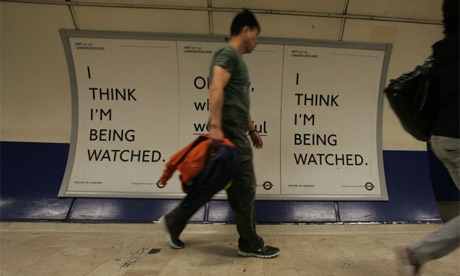Statutes of liberty
From the Magna Carta to CCTV, a new exhibition at the British Library tells the definitive story of the nation's fight for liberty. Historian Tristram Hunt is inspired
-

- The Guardian,
- Thursday October 30 2008

Underground poster referring to CCTV cameras. Photograph: Tony Kyriacou/Rex features
Cancel every school trip; abandon every civics class; relocate every citizenship ceremony: anyone interested in the history and meaning of British liberties needs to head to the British Library in London. For the first time, our constitution is on show.
It was the late Lord Scarman who once suggested that the British constitution was not so much "unwritten", but just "difficult to find". While Americans queue round the block of the National Archives building in Washington to pay homage to the Declaration of Independence, the diffusion of Britain's constitutional record has systematically neutered any popular enthusiasm for this past. It is as if, down the generations, Britain's rulers have never dared to let daylight in upon the magic of their governance.
Now, the neon lights are well and truly on. Beginning with the Magna Carta of 1215 and taking in the death warrant of Charles I, the 1832 Reform Act, the Holloway prison diary of suffragette Olive Wharry, and concluding with the Beveridge Report and the Human Rights Act, this is the definitive story of British liberty told through the printed page. And what these dry parliamentary acts, Hogarth prints and raucous election leaflets all point to is just how hard-fought these rights have proved.
In contrast to Kenneth Baker's planned "museum of Britishness", this is not a Whiggish tale of simple, glorious progress. What the minute-books of the outlawed Corresponding Societies of the 1790s, the photo of the Chartists' 1848 rally on Kennington Common, and the Race Relations Act highlight is the ongoing struggle which enmeshes this history. Liberty and democracy were never handed over on a plate: they were taken by the British people from under the cosh of the policeman's truncheon and the bench of "special juries".
As historian and co-curator Linda Colley points out, Britain - the so-called "mother of parliaments" - was in fact remarkably backward when it came to giving people the vote. "After 1850, the UK increasingly lagged behind other parts of Europe, the US, and even some of its own colonial dominions in the access it afforded to the franchise," she writes in an accompanying essay. "Despite Reform Acts in 1867 and 1884, the UK electorate at the start of the 20th century was one of the narrowest in Europe." Such historical clarity is a useful corrective to our self-congratulatory rhetoric of timeless British freedom.
Indeed, the chauvinism of Gordon Brown finds no echo in this exhibition. What the copies of Jean-Jacques Rousseau's will, the US Declaration of Independence, and an excellent display of Thomas Paine's Rights of Man all point to is the foreign influence on supposedly indigenous, British notions of freedom. True, many theories of democracy and toleration originated here, but then had to be re-imported back to us from William Penn's Pennsylvania or the French national assembly. The much vaunted "golden thread" of British liberty is clearly best approached as an international, Enlightenment phenomenon.
Yet what is particular to these islands is an abiding belief in the rule of law. Sir Edward Coke, the jurist and MP who caused Charles I so much trouble, put it best when he described Magna Carta as "such a fellow, that he will have no sovereign". It is this sense of the righteousness of the law in protecting personal freedom from arbitrary governance (often far more important a liberty than the vote) which has for centuries provided such a powerful vision of the British birthright - and was so recently on display in the House of Lords debate over 42 days detention. The great virtue of Taking Libeties is to make flesh these rather ethereal notions with copies of the Habeas Corpus acts, the 1689 Bill of Rights, as well as suffragette posters of the 1900s all demanding freedom as an uniquely English, then British, attribute.
The exhibition also demands we take part in the process. Today, no museum can afford not to be interactive and, in a clever swipe at the surveillance society, as visitors enter the exhibition they are allocated an electronic tag that then allows them to vote at touch screens on issues raised by the historical documents: does CCTV keep us safe? Do we agree with 42 days detention? Should the NHS treat people who are irresponsible about their health? At the exit, answers are collated on a constantly updated computer screen to reveal a rolling response to modern-day views of liberty. Instantly, the grand narrative of the Petition of Right and Hobbes' Leviathan are made powerfully, if parochially, intelligible. In the shadow of the past, our current battle for rights - to smoke in public places, to drive fast, to refuse to give our DNA - seem both desperately trivial and yet, such is the reach of the modern state, a pathetic fag-end to the freedoms we once enjoyed.
One of the loftier questions posed is whether there should be an English parliament. The documents emphasise the clear disparities between what has historically constituted English and British rights: at one end of the display is the 1706 Articles of Union and a garish notebook detailing various designs for the new Union flag, and at the other the Laws of Hywel Dda (Wales's answer to Magna Carta) as well as the 1320 Declaration of Arbroath, in which the Scottish signatories declared they would never "on any conditions be brought under English rule". More controversially, the curators have also showcased the 1916 Sinn Fein Rebellion Handbook. In the month when the women of Northern Ireland were once again denied the same abortion rights as those on the mainland, the documents highlight that long tradition of strange things happening to British liberty as it crosses the Irish Sea.
As such, the exhibition hints at the recurrent historical tension between the British system of liberties and its imperial implementation. Despite our slave-trading industry, in 1701 Lord Chief Justice Holt could rule that "as soon as a Negro comes into England, he becomes free: one may be a villein in England, but not a slave". This was the language of free-born Englishmen, but it belied our arbitrary practices abroad. Indeed, the actions of officials and soldiers in the British empire often served as warning of the perils of lost liberty. According to Colley, "One of the persistent criticisms levelled against the empire by reformers and jurists was that such abuses overseas might in due course threaten and infect the quality of liberties at home." In ascending order, what happened in a colony today may be done in Ireland tomorrow and England hereafter.
Beyond the legal perimeters of trial and detention, Taking Liberties tackles head on Isaiah Berlin's two concepts of liberty: the "negative liberty" of freedom from interference (celebrated in a copy of JS Mill's On Liberty), as well as the "positive liberty" to achieve human potential. So, the section on "Freedom from Want" looks at the growth of welfare and state support from the friendly societies of the 1800s via the People's Budget up to the founding of the NHS in 1948.
In doing so, the exhibition opens itself up to a Tory critique. Arguably, it was the post-war welfare state that killed off much of that civil society - the dense, social fabric of clubs, associations, and charities - that constituted an essential element of British freedom, in contrast to Continental centralism. On one reading, the great clunking fist of Whitehall smothered the little platoons of British self-help. Conservatives might also detect a subtly anti-royal sensibility with little treatment of the 20th-century monarchy in preserving the constitutional settlement. Disappointingly, the exhibition also dodges today's debates over cultural rights and freedom of speech. There is a scholarly treatment of John Milton's Areopagitica, but nothing on The Satanic Verses.
Instead, the show culminates with an advert from Charter 88 and, with it, an implicit call to arms. British subjects have been very effective over the past 800 years at reining in the power of monarchs. But, in the process, we have taken our eye off parliament. The Levellers of the English civil war were amongst the first to point out that politicians were as dangerous as princes when it came to attacking personal freedom. And now we have ended up with monstrously unchecked governments able to make war and law with all the temerity of an elective dictatorship. The Human Rights Act was one attempt to curb this executive excess, but the political agenda behind these myriad documents and complex charters is to make the case for a modern, written constitution and bill of rights.
But that is not what I took away from Taking Liberties. Instead, the exhibition only served to affirm the fascinating complexity surrounding the British story of liberty and the redundancy of trying to reduce it to a single document. Quite simply, the history is too rich.
No comments:
Post a Comment